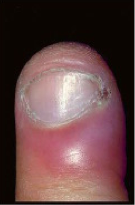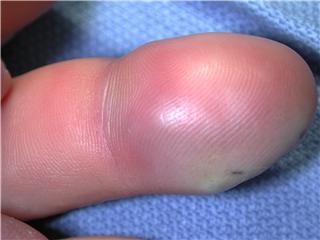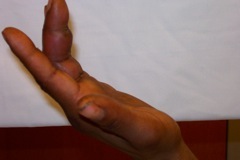Hand infections often start out appearing minor to most people. After all, the infection has to start somewhere, right? What most people don’t realize is that hand infections can cause severe--sometimes permanent--problems if not treated appropriately right away. Stiffness, strength loss, and even skin and bone loss can result!
Some of the most common infections are described below; the key message is that if you suspect an infection, see your doctor right away to start getting rid of it!
Paronychia or Cuticle Infection

This occurs when infection spreads around your fingernail. Redness, swelling, and pain are the first symptoms you might notice. Early treatment usually involves some sort of soaks and antibiotics. Pus can build up in the area and start draining by itself, or your doctor might drain it to help get rid of the infection.
Sometimes you can get a chronic infection around your nail; it might not hurt and might only give you mild symptoms. Usually, this occurs in people whose hands are wet a lot (dishwashers, bartenders, etc.) and is caused by fungus. Special medication and limiting exposure to water are the treatments; occasionally, surgery is needed.
Felon, or Fingertip Infection

This occurs in the “pulp” or fatty area of the fingertip. There are lots of spaces within this area, each divided from the next by walls, or “septae.” Infection within the spaces might be cured by antibiotics and soaks if caught very early, however, you might need this drained by a hand surgeon.
Herpetic Whitlow

You might not realize that herpes virus can infect the hand. Commonly seen in healthcare workers exposed to patients with herpes, this causes a swollen, blistering lesion and sometimes numbness in the affected finger. It usually is treated conservatively and resolves in several weeks; you should protect other areas of your and others’ bodies from exposure to the lesion.
Septic Arthritis/Osteomyelitis
Any wound that enters or is near a joint can cause a severe joint infection that destroys the cartilage around the joint. This generally is treated by surgery, or “washing out” the joint. You might need an extended course of antibiotics. If the infection is not treated, the bone can become infected (osteomyelitis), which requires surgery and a very long course of IV antibiotics.
Deep Space Infections
Your thumb, palm, and web spaces can become infected and require urgent surgery and antibiotics to get rid of the infection before it spreads up the arm. Even a small puncture wound like a cat bite can result in a bad infection, so seek treatment right away!
Tendon Sheath Infection

Your flexor tendons on the palm side of your fingers are surrounded by a sheath through which they glide. A puncture or other wound into the tendon sheath can infect the finger; the infection can spread along the sheath and cause a destructive process called purulent or infectious tenosynovitis. Your finger will want to rest slightly bent. It might be diffusely red and swollen, and extremely painful if you or someone else tries to straighten the finger. This is treated with intravenous antibiotics and surgery to clean out the pus and infection. You might need multiple surgeries to resolve the infection, and a lot of therapy after surgery, because these fingers tend to get very stiff following these infections.
Atypical Mycobacterial Infections

Most hand infections are caused by “typical” or common bacteria. Sometimes, “atypical mycobacterium” cause infections; if this is the case, your antibiotic treatment will differ. These infections develop more gradually than others, and you might not notice as much pain or redness. Still, this can require surgery and antibiotic treatment. Tell your doctor if you have been exposed to fish spines or aquariums or if you have a compromised immune system because of cancer or AIDS.